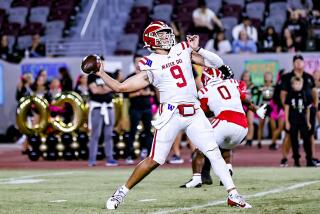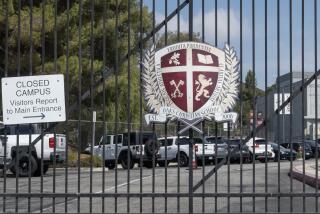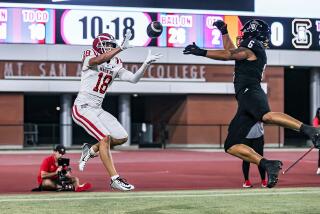Football player alleges he was assaulted by teammates at Santa Margarita Catholic High School

The 15-year-old Santa Margarita Catholic High School student wasn’t sure what to expect when he heard loud cheering and banging sounds coming from the locker room that houses the varsity football team.
As he walked toward the lockers, a player shouted “Get him!” The lights were shut off and several team members slammed him against a locker, pinned him to the ground and took turns “touching, yanking, grabbing, pulling, and twisting his genitals,” according to a lawsuit filed in Orange County Superior Court on Tuesday.
The lawsuit, first reported by the Orange County Register, details a disturbing assault against a sophomore football player that triggered a police investigation and has left the boy with post-traumatic stress disorder, severe depression and anxiety. At least eight other student athletes at the high school have also been assaulted by teammates, according to the lawsuit.
The Orange County Sheriff’s Department has launched an investigation into the incident, according to the lawsuit. The Sheriff’s Department could not immediately be reached for comment. A law enforcement source told the Register that the Sheriff’s Department initially investigated a possible sexual assault but later determined that the assault was not sexual in nature.
Attorneys say Emanuel “Manny” Garcia, a 15-year-old freshman at the time, was injured after in 2021 when he slipped on uneven terrain that was not maintained.
“This kind of stuff shouldn’t happen at any school. It shouldn’t happen in any locker room. It shouldn’t happen to any child,” said Greenberg Gross partner Brian Williams, who is representing the boy’s family. “The adults in charge of programs like this clearly need to do better. They need to do a better job of protecting student athletes and preventing what appears to be a systemic problem within the culture of that team.”
The lawsuit, which names Santa Margarita Catholic High School and the Roman Catholic Bishop of Orange, alleges negligence and intentional infliction of emotional distress. Attorneys are seeking unspecified damages.
Bradley Zint, a spokesperson for the Diocese of Orange, said in an email that the diocese is “currently unable to provide comment and has not yet been served with the complaint.”
The Santa Margarita Eagles football program is highly competitive in the world of high school sports and has produced more than two dozen players who have gone on to the NFL. Head Coach Anthony Rouzier, who was placed on administrative leave, in an announcement made in early October. The school said the coach’s leave was triggered by “incidents within the football program.” It is not clear whether his departure is tied to this incident.
A parent whose child is in the football program said they became aware of the investigation into the locker room incident within days, when law enforcement interviewed players at the school.
The parent, who did not want to be identified to protect their child’s anonymity, said the incident was “blown out of proportion.” The other players denied touching the student in any sexual manner, the parent said.
The parent said the teens would often play a game where they turned off the lights and tried to “scare” other players, but said it was not malicious.
“It was kids being kids. Nobody was punching anyone. It wasn’t even wrestling. It was horseplay,” the parent said.
The boy, described by his attorneys as an athletic teenager, had enrolled at the high school this school year and was excited about the prospect of playing on an esteemed high school football team.
But following the Sept. 24 attack, the student has not wanted to play the sport any longer, according to the lawsuit.
During the attack inside the locker room, the boy fought back against his teammates, which caused him significant bruising, the lawsuit claims. He screamed “no!” and “stop!” as several players groped him and others watched, the lawsuit says.
After the incident, he went to get help from the team’s trainer because he was in pain. But another player stopped him, according to the lawsuit, saying “this is football, you knew what you were signing up for.”
The boy’s mother alerted Rouzier and school administration about incident. Later, during a conversation between the coach and the teen, Rouzier appeared “more focused on [the teen’s] comment that he did not want to play football at SMCHS again than discussing how such an event could occur inside his locker room,” according to the lawsuit.
Less than two weeks after the locker room incident, the boy alleges in the lawsuit that he was targeted by students he didn’t know who approached him from behind and groped him as he was walking in the hallway.
The lawsuit alleges school officials failed to supervise students in the locker room and “turned a blind eye to the tradition of violence ingrained in its football team.”
But other parents whose children are affiliated with the football program disputed the idea that staff tolerated any sort of violence or bullying.
“On the contrary to these hazing assertions there’s been positive mentoring from the players, from upperclassmen toward freshmen kids, in the program,” said Greg Carpenter, whose sons play on the freshman football team. “This portrayal isn’t fair to those kids.”
A lawsuit accuses Mater Dei and the Roman Catholic Diocese of Orange of trying to cover up a brutal locker room altercation that left a player with a traumatic brain injury.
This is the second diocesan high school in Orange County to be roiled with allegations of violence in the football program in recent years.
In 2021, Mater Dei High School’s storied football program was at the center of a lawsuit that alleged a player had suffered a traumatic brain injury after an incident known as “Bodies,” in which two players punch each other between the shoulders and the waist until one gives up. The boy had been punched in the head three times by a larger player, according to video of the incident.
In that case, the Orange County district attorney declined to file charges, saying there was “no evidence of hazing or any other crime that we can prove beyond a reasonable doubt.”
More to Read
Sign up for Essential California
The most important California stories and recommendations in your inbox every morning.
You may occasionally receive promotional content from the Los Angeles Times.













